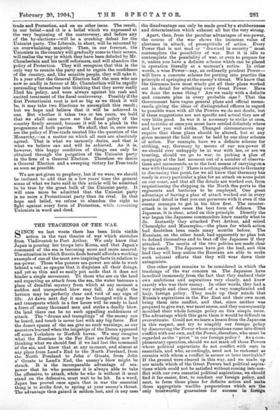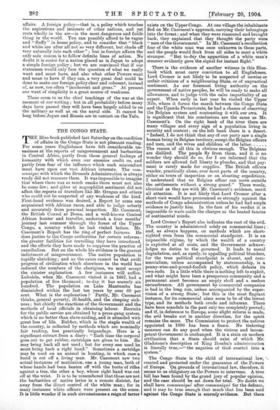THE TEACHINGS OF THE WAR.
Q INCE we last wrote there has been little visible LI action in the vast theatre of war which stretches from Vladivostok to Port Arthur. We only know that Japan is pouring her troops into Korea, and that Japan's command of the sea is becoming more and more assured. The situation in which Russia finds herself affords a working example of one of the most awe-inspiring facts in relation to sea-power. Those who possess sea-power are able to work behind a veil so opaque that it disguises all their doings, and yet so thin and so easily put aside that it does not hinder a single movement. To those who are on the land and expecting an attack from the sea, the water becomes a place of dreadful mystery from which at any moment a sudden and unexpected blow may fall. At night the horizon may be perfectly clear and void of any sign of life. At dawn next day it may be thronged with a fleet and transports which in a few hours will be ready to land a force of many thousand men and strike a deadly blow. On land there can be no such appalling suddenness of attack. The " drums and tramplings " of the enemy can be heard, and touch is never lost with any big force. But the desert spaces of the sea give no such warnings, as our ancestors learned when the longships of the Danes appeared off some Yorkshire or Norfolk haven. We may imagine what the Russians in the Far East are feeling now by thinking what we should feel if we had lost the command of the sea, and knew that at any moment, and almost at any place from Land's End to the North Foreland, from the North Foreland to John o' Groats, from John o' Groats to Land's End, tho enemy's blow might be struck. It is the incomparable advantage of sea- power that he who possesses it is always able to take the offensive, to attack, while he who is without it must stand on the defensive, must wait to be hit. In a word, Japan has proved once again that in war the essential thing is to strike first, to spring at your enemy's throat. The advantage thus gained is seldom lost, and in any case the disadvantage can only be made good by a stubbornness and determination which exhaust all but the very strong.
Apart, then, from the peculiar advantages of sea-power, the course of the war shows the immense value of alertness in attack, of promptitude of action. Every Power that is not mad or " drowned in security " must contemplate the possibility of war. But it is idle to contemplate the possibility of war, or even to prepare for it, unless you have a definite scheme which can be placed in operation literally at a moment's notice. In other words, a wise Power—nay, an ordinarily prudent Power— will have a concrete scheme for putting into practice the principle of springing at the enemy's throat. We know that the Germans have most wisely got all their plans worked out in detail for attacking every Great Power. Have we done the same thing ? Are we ready with a definite and concrete plan in every probable case ? That the Government have vague general plans and official memo- randa giving the ideas of distinguished officers in regard to possible wars with all the Powers we do not doubt, but if these suggestions are not specific and actual they are of very little good. In war it is necessary to strike at once, and to strike at once you must have settled definitely where and how vou will strike. Changed circumstances may require that these plans should be altered, but at any given moment the field must be held by one clear scheme of action. For example, have we a definite scheme for striking, say, Germany by means of our sea-power if we should ever unhappily be at war with her, or are we trusting, should we go to war, to picking a plan of campaign at the last moment out of a number of observa- tions and memoranda as to the best means of carrying on a war with Germany ? There is nothing offensive to Germany in discussing this point, for we all know that Germany has ready in every particular a plan for an attack on some point on our coast, and that all the details are worked out, from requisitioning the shipping in the North Sea ports to the regiments and batteries to be employed. One great advantage of having a plan of attack worked out in every practical detail is that you can persevere with it even if the enemy manages to get in his blow first. The counter- attack is in most cases the best form of defence. The Japanese, it is clear, acted on this principle. Directly the war began the Japanese commanders knew exactly what to do. Instantly they attacked Port Arthur, and seized Chemulpho and Masampho,—the plans for which action had doubtless been made many months before. The Russians, on the other hand, had apparently no plan but to defend themselves and to beat off the Japanese if they attacked. The merits of the two policies are made clear by the result. The Japanese have got the lead, and this lead they will keep unless the Russians are able to make such colossal efforts that they will wear down their antagonists.
One other point remains to be considered in which the teachings of the war concern us. The Japanese have benefited immensely,from the fact that they realised their own ambitions and aspirations very clearly, and knew exactly who was their enemy. In other words, they had a very simple and clear, instead of a very complicated and hazy, foreign policy. They made up their minds that Russia's aspirations in the Far East and their own must bring them into conflict, and that, since neither was prepared to give way, war must ensue, and they consequently moulded their whole foreign policy on this simple issue. The advantage which this gave them it would be difficult to overestimate. Could not we learn a lesson from the Japanese in this respect, and try to simplify our foreign policy by discovering the Power whose aspirations come into direct conflict with our own, and the Power, therefore, who must be regarded as the " pivot " in our foreign policy ? As a com- plementary operation, should we not mark off those Powers whose political aspirations do not conflict with ours in essentials, and who, accordingly, need not be reckoned as enemies with whom a conflict is sooner or later inevitable? If the ground were cleared in this way, and we made up our minds which of the Great Powers had political aspira- tions which could not be satisfied without coming into con- flict with our own essential political aspirations, we should find it far easier, first, to conduct our foreign policy, and next, to form those plans for definite action and make those appropriate warlike preparations which are the only trustworthy guarantees for success in foriiign affairs. A foreign policy—that is, a policy which touches the aspirations and interests of other nations, and yet rests wholly in the air—is the most dangerous and futile thing in the world. You can possibly afford to be vague and " fluffy " in home policy, and to consider that " black and white are after all not so very different, but shade off very naturally into each other" ; but in foreign affairs the only safe course. is to follow definite lines of action. No doubt it is easier for a nation placed as is Japan to adopt a simple foreign policy ; but we are convinced that if our statesmen would only face the question of what we really want and must have, and also what other Powers want and mean to have if they can, a very great deal could be done to make our foreign policy clear and coherent, instead of, as now, too often "incoherent and gross." At present our want of simplicity is a great source of weakness.
These seem to us the chief teachings of the war at the moment of our writing ; but in all probability before many days have passed they will have been largely added to on the military as well as on the naval aide. It cannot be long before Japan and Russia are in contact on the Yalu.











































 Previous page
Previous page